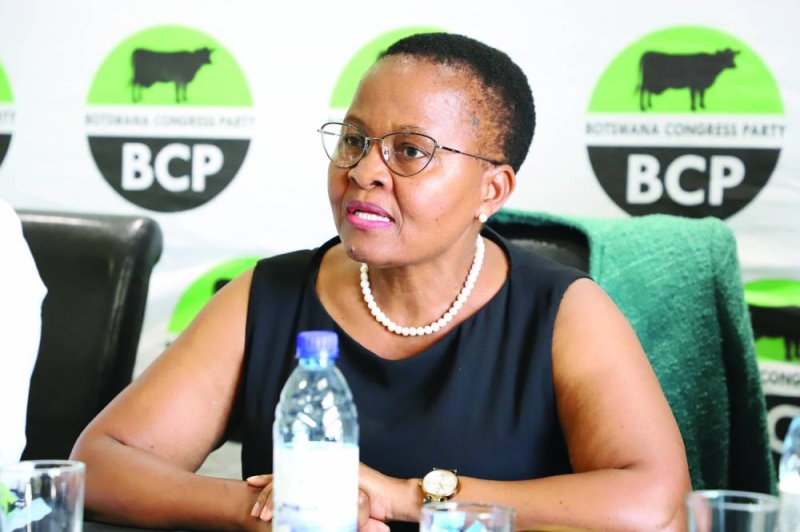Women demand large chunk of party funding budget
Chakalisa Dube | Monday February 19, 2024 06:00


This year, for the first time in history, the government allocated P34 million to fund political parties. The money will be for the 2024-25 fiscal year. The criterion for allocating the budget is still unknown but in an interview this week, the Botswana Congress Party Women’s League president, Tshimologo Dingake, said the allocation of the political party funding budget must be guided by a principle of fairness, integrity, and civic engagement, with a view of encouraging more women to play a leading role in active politics. “The allocation of the political funding budget demands a willingness to confront the systemic inequities and structural barriers that threaten to undermine the democratic process. And above all, it should ensure that a large chunk of money is allocated to women politicians,” Dingake said.
She added: “The government has to be very intentional about ensuring that women are part of leadership or decision-making positions.' There have always been concerns that women are not keen to contest key political leadership positions. Parties have previously used affirmative action policies to encourage women to contest leadership positions but have not been successful. One of the key challenges preventing women from contesting leadership positions is said to be finance or resources. “Most women in Botswana are head of their families, which is why it is difficult for them to sacrifice family resources to fund their participation in politics. That is why we believe that a large share of the political party funding budget should go to women politicians. We have always maintained that the introduction of political party funding will encourage women to contest for council and parliamentary positions. We made the same submission to the constitutional review committee as women politicians in Botswana,” she said. The BCP has gone to an extent of saying that in future it will consider allocating 50% of leadership positions across all our key structures to women, from the current proportion of 30% to build their confidence and ensure that there is equity in terms of leadership in the party.
The Botswana National Front Women’s League (BNFWL) president, Katlego Morolong, share similar sentiments as Dingake. “As the Women’s League, we are confident that the BNF leadership will allocate the bulk of its share from the political party funding budget to all marginalised groups in the party such as people disabilities and women. We will lobby the leadership of the party to allocate more funds to women,” she said.
The number of women who challenge for political positions in Botswana continues to wane. For example, after the 2014 General Election, female representation in politics stood at 8.7 percent. At the elections, out of the 192 parliamentary aspirants, 17 were women. In 2019, only 11 out of 210 parliamentary candidates were women, representing five percent of the total. The opposition has also struggled to send women to Parliament for decades. In January 2014, Dr Habaudi Hobona became the first woman opposition Member of Parliament. Hobona went to Parliament through a by-election. She was followed by the late Same Bathobakae in 2014, who was among the winners at the general election. Since then, the opposition has not sent women representatives to Parliament.
Meanwhile political analyst and a lecturer in Public Administration and Management at the University of Botswana, Adam Mfundisi, has called on the government to establish an independent body to coordinate and administer the funds allocated towards political party funding. Mfundisi has said that to ensure a reasonable as well as just distribution of funds and to some extent level the political playing field, the government should establish an independent body to manage and distribute the funds. “If the BDP is committed to transparency, accountability, openness in the management of the funds, it should provide for an independent institution to manage and allocate the funds,” Mfundisi said in an interview this week.
“An independent body will ensure that there is active engagement of all the stakeholders on all the processes needed and desirable for the funds to be apportioned fairly. The criteria for disbursement must be fair to all political parties. We must avoid for now, the use of the 2019 General Election results for disbursing funds.” Much focus relating to the political party funding budget has been on concerns that the BDP-led government and its leadership cannot be trusted to genuinely commit to introducing durable or equitable funding of political parties. However, Mfundisi is also of the view that the money allocated to political party funding is not enough given challenges amongst local political parties. “The P34 million budget is a unilateral decision by the BDP government with no inputs from other key stakeholders. The President rhetoric on running an inclusive, participative, democratic, accountable government is a mirage,” he added. Even Umbrella for Democratic Change (UDC) spokesperson, Moeti Mohwasa, said the P34 million allocated for political party funding is not enough given the dynamics of the country’s political landscape.
“The BDP government decided on this matter which involves other political players without their involvement. How they arrived at P34m remains a mystery. Campaigns by nature are very expensive. The P34m provision will not be adequate,” he said.
